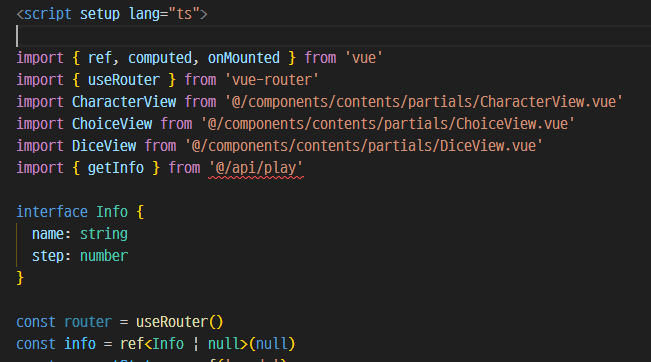Stylish comment block snippets for Vue Composition API files.

1. Features
- Quickly add structured block comments to your Vue files
- Predefined blocks for Imports, Setup, State, etc.
- Empty block snippet for custom block titles
In Vue 2, using the Options API naturally separated code into blocks like data, computed, methods, and watch.
However, the Composition API in Vue 3 is much more flexible: ref, computed, watch, onMounted, etc. can all be used inside a single setup() function.
This flexibility can make it easy for code responsibilities to get mixed together, making it harder to understand the structure—especially as your project grows or you use many composables.
Using Composition API block comments helps logically separate the code inside setup(), improving readability and maintainability.
You can quickly understand how this works by looking at the example below!
3. Example
<script setup lang="ts">
// ===================================================
// 🧠 Vue Core
// ===================================================
import { ref, computed, watch, onMounted } from "vue";
import { useRouter } from "vue-router";
// ===================================================
// 🧩 Components
// ===================================================
import Example1 from "@/components/Example1.vue";
import Example2 from "@/components/Example2.vue";
import Example3 from "@/components/Example3.vue";
// ===================================================
// 📐 Types / Interfaces
// ===================================================
interface User {
id: number;
name: string;
email: string;
isAdmin: boolean;
}
// ===================================================
// 🌐 API / Server Data
// ===================================================
import { getUserInfo, login, logout } from "@/api/example";
// ===================================================
// 📦 State
// ===================================================
const router = useRouter();
const userInfo = ref<User | null>(null);
const showTooltip = ref(false);
// ===================================================
// 🧮 Computed
// ===================================================
const userName = computed(() => userInfo.value?.name);
// ===================================================
// 🛠️ Actions
// ===================================================
async function init() {
userInfo.value = await getUserInfo();
}
// ===================================================
// ⚙️ Methods
// ===================================================
function toggleTooltip() {
showTooltip.value = !showTooltip.value;
}
// ===================================================
// 👀 Watchers
// ===================================================
watch(
() => userName,
(newVal) => {
console.log("userName : ", newVal);
}
);
// ===================================================
// 🚀 Lifecycle Hooks
// ===================================================
onMounted(async () => {
await init();
});
</script>
4. Snippets
Section comments are recommended to be written in the following order to make code flow easier to understand:
Define Data
- Imports
- Props / Emits
- State / Computed
Transform Data
Use Data
The available block types are as follows:
📦 Imports
| Category |
Prefix |
Description |
| 📦 Imports |
block-imports |
Import statements |
| 🧠 Vue Core |
block-core |
Core features provided by Vue |
| 📖 External Library |
block-library |
External libraries |
| 🧩 Components |
block-components |
.vue components |
| 🎨 Assets |
block-assets |
Static resources like styles, images |
| 📐 Types |
block-types |
Type definition files |
| 🌐 API |
block-api |
Modules for server communication |
| 🪽 Utils |
block-utils |
Utility modules |
| 🪝 Composables |
block-composables |
Custom composable functions in the project |
| 🗃️ Stores |
block-store |
Pinia state management modules |
📥 Props / Emits
| Category |
Prefix |
Description |
| 📥 Props/Emits |
block-props |
Properties and events passed from the parent component |
📦 State
| Category |
Prefix |
Description |
| 📦 State |
block-state |
Data state managed within the component |
| 🎨 UI State |
block-ui |
Variables related to the UI |
| ⏳ Loading State |
block-loading |
Variables related to loading states |
| ⚠️ Error State |
block-error |
Variables related to error states |
| 🔢 Constants |
block-constants |
Constant definitions |
| 🧮 Computed |
block-computed |
Derived values automatically calculated from dependent data |
| Category |
Prefix |
Description |
| 🛠️ Actions |
block-actions |
Logic units that include multi-step workflows |
| ⚙️ Methods |
block-methods |
Single-purpose action functions (UI, input, state control, etc.) |
| 👀 Watchers |
block-watch |
Watches that perform actions when specific values change |
🚀 Use Data
| Category |
Prefix |
Description |
| 🚀 Lifecycle |
block-lifecycle |
Perform initialization or tasks in Vue lifecycle hooks |
5. Installation
Using VS Code Marketplace
- Open VS Code
- Go to the Extensions panel
- Search for Vue Comment Blocks
- Click Install
Using CLI
You can also install the extension via the command line:
code --install-extension Y0UNGBLUD.vue-comment-blocks
6. Usage
- Open a
.vue file in VS Code.
- Type the snippet prefix (e.g.,
block-imports, block-state, block-empty) and press Tab.
- The snippet will expand into the corresponding block comment.
Note: All snippet prefixes start with block-.


